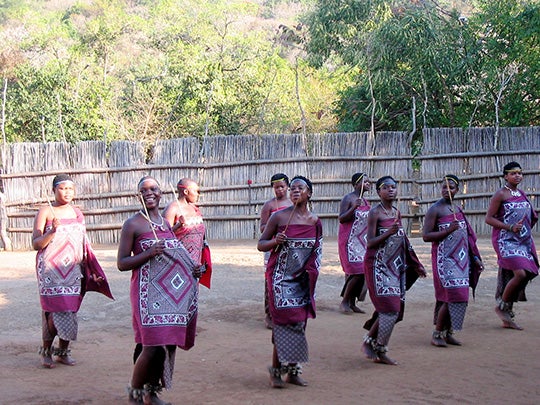
When I was a child I lived in two worlds. The first world was a creative one, filled with music, a teeming treasure of sounds that stretched from church to nature. It included thunderous organ chords, melodious tube fiddles, and raspy frog choruses, to name a few. The other world I inhabited was more sober in nature, marked with political instability, hardships, and poverty. These two worlds came together in a loud cacophony that is my home country, Uganda.
Like much of Africa, Uganda is no stranger to strife. As the story often goes, many of us grew up wearing imported second-hand clothes, which some say, crashed our textile industry. Many of us walked to school for miles barefoot, only to be spanked for lateness or poor grades. Potholes ruled the roads (and they still do), prompting a friend to tell me that some streets turn into swimming pools after heavy rains.
And the list of problems goes on and on, frequently overshadowing the reality and progress of Africa, and detracting from the visibility of its creative wealth. As a musician, the melodies of the arts world meant everything to me and helped me understand the role that it has in our lives. When HIV/AIDS descended on Uganda, even infecting young classmates of mine, a Ugandan singer, Philly Lutaaya, took it upon himself to sing messages raising awareness of the disease across the country. When artillery rocked my home city of Kampala, escaping to sing in a choir kept my spirits high. When I was hungry, I bought food using income from playing and teaching music. Simply put, my first world guarded me; it overrode the other world.
So naturally I’ve been intrigued by the possibilities of mobilizing the arts behind development. So much so, that after studying music and teaching at Phillips Academy, I decided to study international affairs. The idea was to make some analytical effort to understand how creative output can promote development rather than simply talk about it. The outcome was a thesis on music and international trade and more recently, a working paper entitled “The Creative Wealth of Nations: How the Performing Arts can Advance Development and Human Progress” with a foreword by Amartya Sen. The paper asks, “How can the creative wealth of nations, in which artistic output matters, contribute to promoting shared prosperity and ending extreme poverty by 2030 ?”
To answer this question, we have to fully acknowledge that the arts can contribute to social progress and economic growth. In places like Africa, where cultural diversity is richer than we will ever know, this acknowledgement is critical. It can unleash all sorts of possibilities in a world of limited resources. As we try to fund dams and roads, we should also seek ways to promote African trade in music and films, for example. As we try to attack the tyranny of gender bias or reform the judiciary and governance, we should seek ways to use culture to promote social progress. As we invite ministers of finance to the World Bank, we should also invite ministers of culture to discuss the promotion of cultural output and innovation in the so-called new economy.
By overlooking the cultural wealth of developing countries, we miss the bigger picture. There are no easy answers, but we need to ask how the arts can be a part of sound economic strategies to help diminish the wretchedness that I have seen in places such as my home country.
The arts cannot do it alone, but they can be part of the solution. Creativity in places like Africa could play a notable role in reducing extreme poverty and sharing prosperity — only, if we care to actively consider such wealth in our thinking.


Join the Conversation